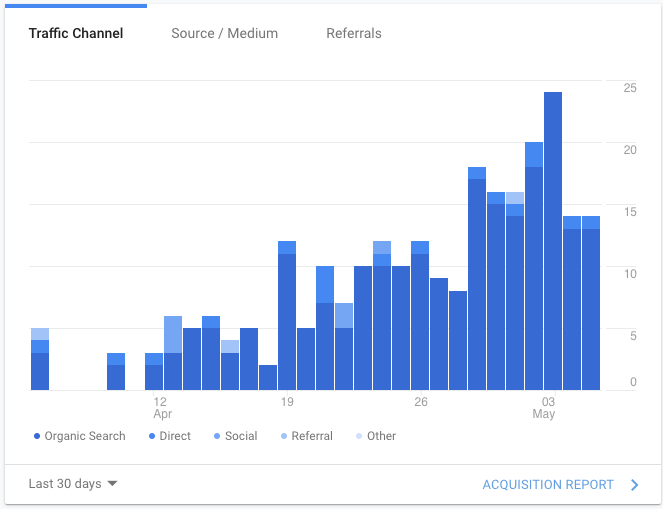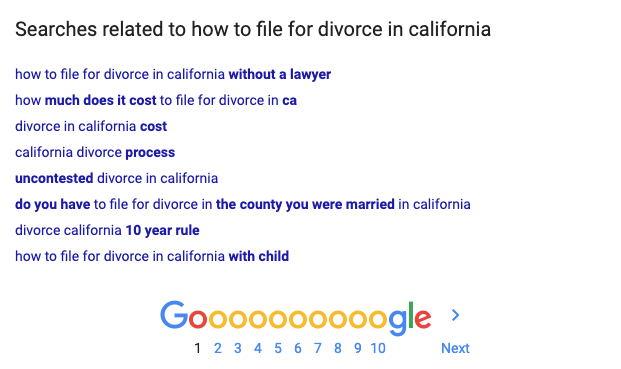Keywords make the search engine optimization world go round.
Keywords include the actual words that appear on your law firm’s website and the words people put into search engines when they go looking for something.
Basically, whenever anyone searches for something, Google wants to return the “best,” most relevant, high-quality hits. It tries to do this in part by matching the search query to the words on your website.
All that to say – keywords play a big role in search engine algorithms.
So let me ask… how much keyword research did you do while you were writing your last blog post? How about when you were writing the content pages for your law firm’s website?
Did you aim for long-tail keyword phrases and high-intent keywords?
High-intent users who visit your website are much more likely to convert into paying clients. You can target high-intent users based on the types of keywords they put into Google when they’re searching. Someone who types, “when to hire a divorce lawyer in California” is much more likely to actually be looking to hire a lawyer than someone who types, “what’s the rate of divorce in California?”
The static pages on your website are valuable real estate that stays up for a long time. For almost all of my law firm clients, their static practice area pages are the bread and butter of their website – and for good reason. People need to know what you do to hire you for it. You want the content here to have relevant keywords that attract the right types of clients.
For your content to gain traction in search engines, you need to do your keyword research not just for blog posts, but for every page you have published online.
Even if some of your website pages are “static,” there’s no reason you can’t freshen them up.
Click here for answers to the most frequently asked questions about legal content and SEO.
Optimize Your Online Assets
Think of every blog post, website page, and piece of online content as an asset. These assets can grow exponentially in value over time. You can also continue to improve them.

Below I’ll go over how to take the content you already have, do a little bit of keyword research, and add those keywords to your web pages to make them rank higher on Google and other search engines.
I’ve noticed in my career that sometimes client websites just need a bit of tweaking to shine.
Consider a client with a practice area page that’s 700 words long. I consider 1000 words to be the absolute baseline for any SEO page that wants to rank anywhere near the coveted Page 1 of Google. Especially for law-related websites, where competition is high. (It’s a myth that people don’t read long content. Search engines especially love longer content – the more comprehensive, the better.)
It would take only 300 words to take that 700-word page, add 5-10 relevant keywords naturally into the text, and take it from page 3 purgatory to Google Page 1 material.
The whole process is easier than writing a new blog post from scratch.
What exactly is keyword research, what’s the best way to do it, and how will it help your law practice?
Fortunately, keyword research doesn’t have to be hard. 90% of the keyword research I do is typing phrases into Google search. You just have to know what to look for and where to go.
Keyword Research Tips
- Pick a page or post that’s already on your website and think of words and phrases that people might use to search for that topic.
- Use Google “related search terms” to find related searches for that topic.
- Use Google keyword planner to pick the keyword you want to focus on.
- Update your blog post with your keywords and publish your changes.
When choosing keywords, you don’t want to aim for short, generic keywords like “personal injury lawyer” because there are so many websites fighting to rank for them. It’s very difficult to fight your way to the top of that pile – and your efforts are better spent elsewhere.
Instead, you want to aim for lower-competition long-tail keyword phrases in your practice areas. These are more focused and specific and are generally 3 words or longer. We want to aim for actual phrases that people type into Google when searching for your services.
Below are two of the best free keyword research tools that make the process short and simple.
The Google Search Method
One of the best keyword tools and the easiest way to get keyword ideas is to just use Google Search.
Let’s say you’re a Los Angeles family lawyer and you have a practice area page or blog post about divorce. You think people might search for: how to file for divorce in California. You can put that search into Google and scroll all the way down to the bottom, where Google shows related searches.

These are all keywords that you can use. You can also click on these related searches, scroll all the way down again, and see more related searches.
Not only does this give you a good idea of what keywords to target, but it’s also an interesting look at the behavior of your target market. Your research might take you in an unexpected direction. You may find there’s demand for a certain practice area or service you hadn’t considered before.
Google Keyword Planner
For more keyword ideas and to see keyword data, you can use the free Google Keyword Planner.
You have to sign up for a Google AdWords account to use the Google Keyword Planner. However, you don’t have to pay for anything or put in your payment information.
Once you sign into the Google Keyword Planner, click Discover New Keywords.

Input your keyword phrases, pressing enter after each. Then click Get Results.

Make sure when you get your results to click Avg. monthly searches to sort by traffic.

How to Choose and Use Keywords
You want to aim for keywords with the highest traffic and lowest competition.
Choose one keyword phrase to be your focus keyword and make sure to mention it naturally in your content several times, depending on the length of your page. Use it in your title (H1) and your content headers (H2, H3) for maximum effect. Try to use it near the beginning of your content.
Choose 3-5 other keyword phrases to add to your page. Make sure while you’re writing keyword-rich content that it sounds natural.
Don’t overdo it here. Keyword stuffing is a big SEO no-no. People don’t like reading keyword-stuffed pages with low value and Google will penalize you for it.
That’s it! Once you’re done optimizing your keywords, publish your changes.
The next time Google crawls your website, it will pick up all of these new keywords.
Keyword research is part of the service I provide to all of my legal content writing clients. Click here to learn more about how a legal content writer can help your law firm.
